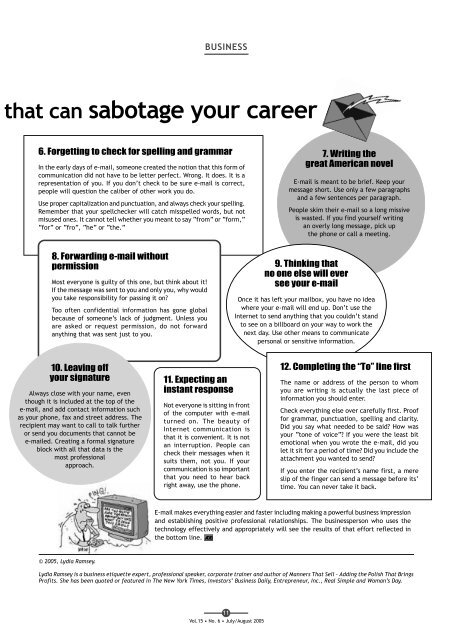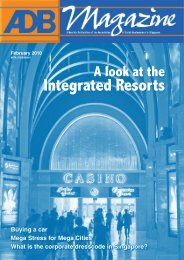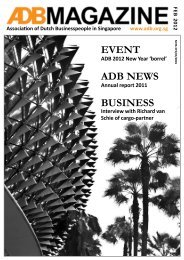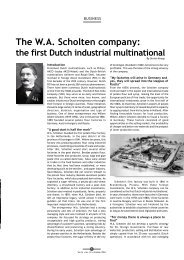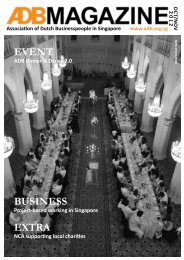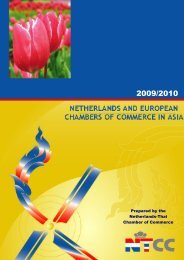August 2005 - Association of Dutch Businessmen
August 2005 - Association of Dutch Businessmen
August 2005 - Association of Dutch Businessmen
Create successful ePaper yourself
Turn your PDF publications into a flip-book with our unique Google optimized e-Paper software.
BUSINESS<br />
that can sabotage your career<br />
6. Forgetting to check for spelling and grammar<br />
In the early days <strong>of</strong> e-mail, someone created the notion that this form <strong>of</strong><br />
communication did not have to be letter perfect. Wrong. It does. It is a<br />
representation <strong>of</strong> you. If you don’t check to be sure e-mail is correct,<br />
people will question the caliber <strong>of</strong> other work you do.<br />
Use proper capitalization and punctuation, and always check your spelling.<br />
Remember that your spellchecker will catch misspelled words, but not<br />
misused ones. It cannot tell whether you meant to say “from” or “form,”<br />
“for” or “fro”, “he” or “the.”<br />
7. Writing the<br />
great American novel<br />
E-mail is meant to be brief. Keep your<br />
message short. Use only a few paragraphs<br />
and a few sentences per paragraph.<br />
People skim their e-mail so a long missive<br />
is wasted. If you find yourself writing<br />
an overly long message, pick up<br />
the phone or call a meeting.<br />
8. Forwarding e-mail without<br />
permission<br />
Most everyone is guilty <strong>of</strong> this one, but think about it!<br />
If the message was sent to you and only you, why would<br />
you take responsibility for passing it on?<br />
Too <strong>of</strong>ten confidential information has gone global<br />
because <strong>of</strong> someone’s lack <strong>of</strong> judgment. Unless you<br />
are asked or request permission, do not forward<br />
anything that was sent just to you.<br />
9. Thinking that<br />
no one else will ever<br />
see your e-mail<br />
Once it has left your mailbox, you have no idea<br />
where your e-mail will end up. Don’t use the<br />
Internet to send anything that you couldn’t stand<br />
to see on a billboard on your way to work the<br />
next day. Use other means to communicate<br />
personal or sensitive information.<br />
10. Leaving <strong>of</strong>f<br />
your signature<br />
Always close with your name, even<br />
though it is included at the top <strong>of</strong> the<br />
e-mail, and add contact information such<br />
as your phone, fax and street address. The<br />
recipient may want to call to talk further<br />
or send you documents that cannot be<br />
e-mailed. Creating a formal signature<br />
block with all that data is the<br />
most pr<strong>of</strong>essional<br />
approach.<br />
11. Expecting an<br />
instant response<br />
Not everyone is sitting in front<br />
<strong>of</strong> the computer with e-mail<br />
turned on. The beauty <strong>of</strong><br />
Internet communication is<br />
that it is convenient. It is not<br />
an interruption. People can<br />
check their messages when it<br />
suits them, not you. If your<br />
communication is so important<br />
that you need to hear back<br />
right away, use the phone.<br />
12. Completing the “To” line first<br />
The name or address <strong>of</strong> the person to whom<br />
you are writing is actually the last piece <strong>of</strong><br />
information you should enter.<br />
Check everything else over carefully first. Pro<strong>of</strong><br />
for grammar, punctuation, spelling and clarity.<br />
Did you say what needed to be said? How was<br />
your “tone <strong>of</strong> voice”? If you were the least bit<br />
emotional when you wrote the e-mail, did you<br />
let it sit for a period <strong>of</strong> time? Did you include the<br />
attachment you wanted to send?<br />
If you enter the recipient’s name first, a mere<br />
slip <strong>of</strong> the finger can send a message before its’<br />
time. You can never take it back.<br />
E-mail makes everything easier and faster including making a powerful business impression<br />
and establishing positive pr<strong>of</strong>essional relationships. The businessperson who uses the<br />
technology effectively and appropriately will see the results <strong>of</strong> that effort reflected in<br />
the bottom line.<br />
© <strong>2005</strong>, Lydia Ramsey.<br />
Lydia Ramsey is a business etiquette expert, pr<strong>of</strong>essional speaker, corporate trainer and author <strong>of</strong> Manners That Sell - Adding the Polish That Brings<br />
Pr<strong>of</strong>its. She has been quoted or featured in The New York Times, Investors’ Business Daily, Entrepreneur, Inc., Real Simple and Woman’s Day.<br />
11<br />
Vol.15 • No. 6 • July/<strong>August</strong> <strong>2005</strong>


